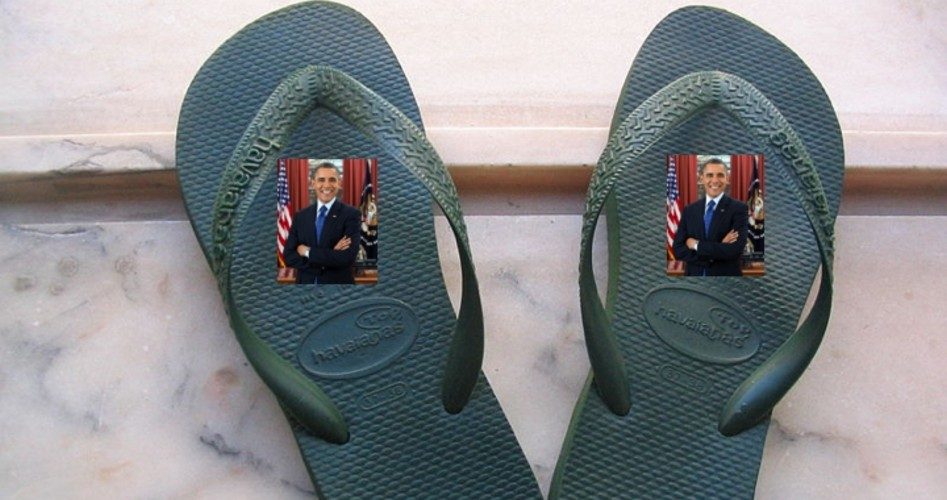
“The number of immigrants added to the labor force every year is of a magnitude not seen in this country for over a century. If this huge influx of mostly low-skill workers provides some benefits to the economy as a whole — especially by keeping our workforce young, in contrast to an increasingly geriatric Europe and Japan — it also threatens to depress further the wages of blue-collar Americans and put strains on an already overburdened safety net.” So reports the Daily Caller’s Neil Munro on words to be heeded during the current amnesty debate. These thoughts are especially poignant since they aren’t the comments of House Speaker John Boehner, commentator Pat Buchanan, or the group NumbersUSA. They are, rather, the opinion of that other anti-illegal-alien crusader Barack Obama.
The passage is from his 2006 autobiography The Audacity of Hope: Thoughts on Reclaiming the American Dream, penned when Obama was considering a presidential run. But now, critics might say, Obama should write The Audacity of the Flip-flop, with his insistence that legalizing border-violating lawbreakers is “the right thing to do” and apparent intention to use executive orders to effect this action.
The aforementioned wasn’t all Obama had to say about the illegal-migration threat, either. As Munro also reports, “‘There’s no denying that many blacks share the same anxieties as many whites about the wave of illegal immigration flooding our Southern border — a sense that what’s happening now is fundamentally different from what has gone on before,’ then-Senator Obama wrote in his 2006 autobiography…. ‘Not all these fears are irrational,’ he wrote.”
Obama the Nativist?
While political activist and city-council candidate Tressy Capps recently lost her job for complaining about someone flying the Mexican flag on American soil, it seems the 2006 Obama could empathize with her. As Munro wrote:
“Native-born Americans suspect that it is they, and not the immigrant, who are being forced to adapt” to social changes caused by migration, he [Obama] said.
“And if I’m honest with myself, I must admit that I’m not entirely immune to such nativist sentiments,” Obama wrote. “When I see Mexican flags waved at pro-immigration demonstrations, I sometimes feel a flush of patriotic resentment. When I’m forced to use a translator to communicate with the guy fixing my car, I feel a certain frustration.”
Yet Obama’s frustration seems a thing of the past, with his refusal to enforce immigration law and recent flooding of the United States with tens of thousands of often disease-carrying illegal-alien minors and adults; this action has been implicated in the enterovirus D68 outbreak in America, which has sickened hundreds of citizens, some of whom have suffered paralysis or even death.
Obama’s Coronation
The president has not always been so bold with respect to taking unilateral action on migration. Not only did he wait until after the November 4 election to announce executive amnesty plans, but as Tony Lee at Breitbart recently pointed out:
In 2013, a pro-amnesty heckler in San Francisco interrupted Obama’s speech and screamed that Obama had the “power to stop all deportations.” Obama replied by saying, “Actually, I don’t.”
“The easy way out is to try to yell and pretend like I can do something by violating our laws,” Obama said then. “If in fact I could solve all these problems without passing laws in Congress, I would do so.”
Obama expressed similar sentiments in a 2010 interview with the Spanish-language media outlet Univision, saying when asked why he wasn’t doing more on immigration, “The most important thing that we can do is to change the law because [that’s] the way the system works — again, I just wanna repeat, I’m president, I’m not king.” Obama echoed this theme in an interview with Univision last year, stating, “I’m not a king. I am the head of the executive branch of government. I’m required to follow the law. And that’s what we’ve done.”
Yet taking action without passing laws in Congress — and, as some critics have said, acting as a king — is precisely what Obama is now poised to do.
Some would say this sea change in attitude toward migration is another Obama “evolution,” to use the word the president did to describe his flip-flop on faux marriage. In that case, Obama had said when running for the Senate in 2004 that “marriage is between a man and a woman,” that when a man and a woman get married they “are performing something before God, and it’s not simply the two persons who are meeting”; he also said “I don’t think marriage is a civil right.”
After years of equivocating, however, this changed six months before the 2012 election when the president said that during lengthy discussions with various people — including his two young daughters — “he now ‘personally’ believes gays and lesbians should have the right to marry,” wrote the Wall Street Journal in May of that year. Obama’s daughters, Malia and Sasha, were, respectively, 13 and 10 at the time.
But little known is that this wasn’t Obama’s first evolution on marriage. In a typed, signed statement in response to a questionnaire from the Chicago LGBT newspaper Outlines, Obama opined in 1996, “I favor legalizing same-sex marriages, and would fight efforts to prohibit such marriages,” reported ABC News in 2012.
Yet the president’s defenders could point out that this is thoroughly consistent with the Theory of Evolution, which states that creatures change over time to adapt to their environments. And a 1996 interview with a big-city, homosexual newspaper, a 2004 Senate race, and a 2012 presidential reelection campaign are certainly very different political environments.
But whether one calls it evolution, flip-flops, or something else, Obama has become known for them. His statement when defending ObamaCare, “If you like your doctor, you can keep your doctor,” has become a punch line. And former George W. Bush Press Secretary Ari Fleischer provides 10 other examples here.
Yet another little known flip-flop concerned Obama’s 2004 statement that he wouldn’t have enough experience to run for the presidency in 2008. Responding to a reporter who asked at the time, “Why have you ruled that out, running nationally?” Obama said, “I am a believer in knowing what you’re doing when you apply for a job. And I think that if I were to seriously consider running on a national ticket, I would essentially have to start now, before having served a day in the Senate. Now there are some people who might be comfortable doing that, but I’m not one of those people.”
And looking at poll numbers, it appears that increasing numbers of Americans wish they had listened to the 2004 Obama and not the 2008 Obama.



